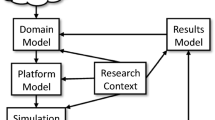Abstract
In this chapter, we discuss how scenario analysis can contribute to the validation of agent-based modeling and simulation (ABMS). We describe the basic architecture and characteristics of ABMS. We also introduce the concept and method of scenario analysis and explain that validation by users (stakeholders) is critical for the acceptance of ABMS practitioners’ proposals. Next, we discuss a validation problem relative to the arbitrary representation of ABMS results. For this problem, we propose a framework of ABMS validation that emphasizes the stakeholders’ learning through a participatory scenario-analysis phase with no arbitrary ABMS results. Furthermore, we recognize the need for an information system that supports the participatory scenario-analysis phase by the stakeholders in real time. Finally, we conclude that scenario analysis solves the validation problem of arbitrarily presenting ABMS results.
Access this chapter
Tax calculation will be finalised at checkout
Purchases are for personal use only
Similar content being viewed by others
References
North MJ, Macal CM (2007) Managing business complexity. Oxford University Press, New York
Epstein JM (2009) Modelling to contain pandemics. Nature 460:687
Goto Y, Takahashi S (2010) Landscape analysis of possible outcomes. In: Chen SH, Terano T, Yamamoto R (eds) Agent-based approaches in economic and social complex systems VI. Springer Series on ABSS, vol 8. Springer, Tokyo, pp 87–98
Deguchi H (2009) Dawn of agent-based social systems sciences. In: Deguchi H, Kijima K (eds) Manifesto: agent-based social systems sciences. Keiso-Shobo, Tokyo [in Japanese]
Ohori K, Takahashi S (2012) Market design for standardization problems with agent-based social simulation. J Evol Econ 22:49–77. doi:10.1007/s00191-010-0196-y
Richiardi M, Leombruni R, Saam N, Sonnessa M (2006) A common protocol for agent-based social simulation. J Artif Soc S 9, p 15. Accessed 19 January 2013. http://jasss.soc.surrey.ac.uk/9/1/15.html
Sargent RG (2000) Verification, validation, and accreditation of simulation models. In: Joines JA, Barton RR, Kang K, Fishwick PA (eds) Proceedings of the 2000 Winter Simulation Conference. Society for Computer Simulation International, San Diego, CA, pp 50–59
Gilbert N (2007) Agent-based models. Sage, Los Angeles
Axtell R, Axelrod R, Epstein JM, Cohen MD (1996) Aligning simulation models: a case study and results. Comput Math Org Theory 1:123–141
Hales D, Rouchier J, Edmonds B (2003) Model-to-model analysis. J Artif Soc S 6, p 5. Accessed 19 January 2013. http://jasss.soc.surrey.ac.uk/6/4/5.html
Yoon M, Lee K (2009) Agent-based and history-friendly models for explaining industrial evolution. Evol Inst Econ Rev 6:45–70
Goto Y, Takahashi S, Senoue Y (2009) Analysis of performance measurement system for knowledge sharing under intraorganizational competition. J Jpn Soc Manag Info 18:15–49 [in Japanese]
Louie MA, Carley KM (2008) Balancing the criticisms: validating multi-agent models of social systems. Simul Model Pract Theory 16:242–256. doi:10.1016/j.simpat.2007.11.011
Barreteau O (2003) The joint use of role-playing games and models regarding negotiation processes: characterization of associations. J Artif Soc S 6, p 3. Accessed 19 January 2013. http://jasss.soc.surrey.ac.uk/6/2/3.html
Ramanath AM, Gilbert N (2004) The design of participatory agent-based social simulations. J Artif Soc S 6, p 1. Accessed 19 January 2013. http://jasss.soc.surrey.ac.uk/7/4/1.html
Espejo R, Schuhmann W, Schwaninger M, Bilello U (1996) Organizational transformation and learning: a cybernetic approach to management. Wiley, Chichester
Ohori K, Kobayashi N, Obata A, Takahashi A, Takahashi S (2012) Decision support for management of agents’ knowledge and skills with job rotation in service-oriented organization. In: Proceedings of the 45th Hawaii International Conference on System Sciences, pp 1492–1501. doi:10.1109/HICSS.2012.195
Deguchi H, Saito T, Ichikawa M, Tanuma H (2011) Simulated tabletop exercise for risk management: anti bio-terrorism multi scenario simulated tabletop exercise. Dev Bus Simul Exp Learn 38:1–21
Argyris C, Schön DA (1996) Organizational learning II: theory, method, and practice. Addison-Wesley, Reading, MA
Heath B, Hill R, Ciarallo F (2009) A survey of agent-based modeling practices (January 1998 to July 2008). J Artif Soc S 12, p 9. Accessed 19 January 2013. http://jasss.soc.surrey.ac.uk/12/4/9.html
Barnaud C, Promburom T, Trebuil G, Bousquet F (2007) An evolving simulation/gaming process to facilitate adaptive watershed management in northern mountainous Thailand. Simul Gaming 38:398–420. doi:10.1177/1046878107300670
Acknowledgments
This chapter is modified and extended from the earlier version presented at the conference (AESCS 2012). We appreciate the participants and two anonymous reviewers for helpful comments. This work was supported in part by a Grant-in-Aid for Scientific Research 21310097 and 22730312 of Japan Society for the Promotion of Science.
Author information
Authors and Affiliations
Corresponding author
Editor information
Editors and Affiliations
Rights and permissions
Copyright information
© 2013 Springer Japan
About this paper
Cite this paper
Goto, Y., Takahashi, S. (2013). Agent-Based Modeling and Simulation Validation by Scenario Analysis. In: Murata, T., Terano, T., Takahashi, S. (eds) Agent-Based Approaches in Economic and Social Complex Systems VII. Agent-Based Social Systems, vol 10. Springer, Tokyo. https://doi.org/10.1007/978-4-431-54279-7_1
Download citation
DOI: https://doi.org/10.1007/978-4-431-54279-7_1
Published:
Publisher Name: Springer, Tokyo
Print ISBN: 978-4-431-54278-0
Online ISBN: 978-4-431-54279-7
eBook Packages: Computer ScienceComputer Science (R0)




